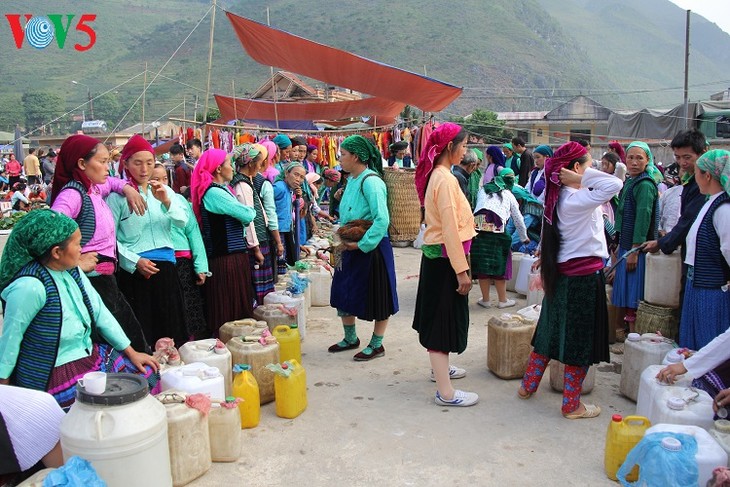(VOVWORLD) -Although ethnic minority people are a small percentage of the population, they are an inseparable part of the nation. The Vietnamese Party and government have policies to ensure ethnic cultural preservation along with socio-economic development, poverty reduction, and social welfare.
 A market fair of ethnic groups in Ha Giang province (Lan Anh) A market fair of ethnic groups in Ha Giang province (Lan Anh)
|
Cultural Day of Vietnam’s Ethnic Groups, which is being observed at the Viet Nam National Village for Ethnic Culture and Tourism in Hanoi, is an illustration of the government’s effort to respect, preserve, and promote the traditional cultures of ethnic groups. The annual event was first held in 2010.
Traditional cultures of ethnic groups respected
Respecting and promoting the traditional cultures of ethnic groups was affirmed by the Communist Party of Vietnam in a platform for national construction in the transitional period to socialism, which was revised in 2011, a Party Resolution on “Building and developing an advanced Vietnamese culture imbued with national identity”, and another Party Resolution adopted in 2014 on “Building and developing a Vietnamese culture and people to meet national sustainable development”.
Article 42 of the 2013 Constitution states that “A citizen has the right to determine his or her nationality, use his or her mother language and select his or her language of exchange.” Article 7 of the 2015 Law on Education states: “The government creates conditions for ethnic people to study the speaking and writing of the language of their group.” The articles guarantee that ethnic people have the right to decide their origin and use the spoken and written language of their group. It illustrates that all ethnic groups in Vietnam are equal.
Ethnic cultural preservation in parallel with development
The government has implemented a project to preserve and develop the cultures of Vietnam’s ethnic groups until 2020, focusing on the cultures of extremely small groups and those unable to protect and develop their own cultures. The Ministry of Culture, Sports, and Tourism has reviewed and offered urgent support for groups of less than 10,000 people to protect their cultures. These include the Brau, Ro Mam, Si La, Pu Peo, Bo Y, O Du, Lo Lo, Mang, Cong, and Co Lao groups.
The project has helped revitalize many fine traditions, unique rituals, festivals, folkart, dances, songs, costumes, and folk games of ethnic groups and introduced them at cultural festivals. Cultural festivals of the northwest, northeast, central, and southeast regions have created opportunities for ethnic people to honor their unique cultures. It’s a way to ensure their cultural right.
More than 90% of ethnic households have access to Voice of Vietnam radio programs and 80% can watch TV. Radio and TV programs in Vietnamese and 26 ethnic languages are broadcast to remote villages.
In 2012, Vietnam’s all villages fulfilled the program of universal primary education and 95% of ethnic children attended school.
Preservation of the written and spoken language of ethnic groups is a priority of Vietnam’s educational policy. Since 2008, the Ministry of Education and Training has cooperated with UNICEF to pilot the teaching of Vietnamese and one local ethnic language in Lao Cai, Tra Vinh, and Gia Lai province, which has helped to reduce the number of children dropping out of school.